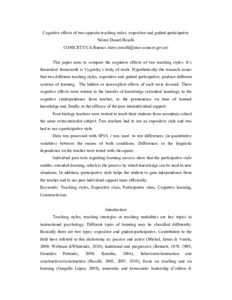Por favor, use este identificador para citar o enlazar este ítem:
https://repositorio.uca.edu.ar/handle/123456789/15738| Título: | Cognitive effects of two opposite teaching styles: expositive and guided-participative | Autor: | Roselli, Néstor Daniel | Palabras clave: | ENSEÑANZA; APRENDIZAJE; ESTILOS PERSONALES | Fecha de publicación: | 2014 | Editorial: | Routledge | Cita: | Roselli, N.D. Cognitive effects of two opposite teaching styles: expositive and guided-participative [en línea]. En: Cooper, S. Ratele, K. Psychology Serving Humanity: Proceedings of the 30th International Congress of Psychology - Volume 1: Majority World Psychology. Routledge, 2014 Disponible en: https://repositorio.uca.edu.ar/handle/123456789/15738 | Resumen: | Abstract: This paper aims to compare the cognitive effects of two teaching styles. It´s theoretical framework is Vygotsky´s body of work. Hypothetically the research issues that two different teaching styles, expositive and guided participative, produce different systems of learning . The hidden or non-explicit effects of each were focused. These cognitive effects were related to the transfer of knowledge (extended learning), to the cognitive (in)dependence from teacher, to the permanence on time of learned knowledge and, finally, to the efficacy of the peer interindividual support. Four biology teachers were invited to teach their students from secondary school the same extracurricular subject. Two teachers had to use an expositive style and two had to use a participative style. Data was processed with SPSS. t was used to test differences (in quantitative variables) between the means of both conditions. Differences in the linguistic dependence on the teacher were tested with chi-square. Individual post tests regarding learning success show that the participative style enables extended learning, which is the process by which knowledge can be used in new situations. In addition, participative style helps the student to gain independence from the teacher and to use peer individual support more efficiently. Keywords: Teaching styles, Expositive class, Participative class, Cognitive learning, Constructivism. | URI: | https://repositorio.uca.edu.ar/handle/123456789/15738 | ISBN: | 978-1-315-77719-1 (online) 978-1-84872-255-2 |
Disciplina: | DERECHO | Derechos: | Acceso abierto | Fuente: | Cooper, S. Ratele, K. Psychology Serving Humanity: Proceedings of the 30th International Congress of Psychology - Volume 1: Majority World Psychology. Routledge, 2014 |
| Aparece en las colecciones: | Libros/partes de libro |
Ficheros en este ítem:
| Fichero | Descripción | Tamaño | Formato | |
|---|---|---|---|---|
| cognitive-effects-two.pdf | 119,77 kB | Adobe PDF |  Visualizar/Abrir |
Visualizaciones de página(s)
48
comprobado en 27-abr-2024
Descarga(s)
20
comprobado en 27-abr-2024
Google ScholarTM
Ver en Google Scholar
Altmetric
Este ítem está sujeto a una Licencia Creative Commons

